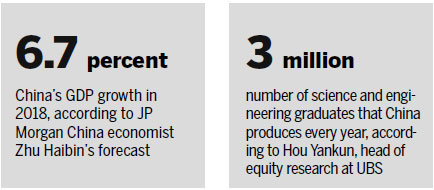Sweet spot in economic transition
( China Daily )
Updated: 2018-01-22
|
|||||||||
Global banks cheer strong China data that promises a good year ahead
BEIJING - With a string of encouraging data, China's economy kicked off 2018 on a positive note, adding to optimism among international financial institutions about the world's second-largest economy.
Although there remain downside risks, international banks believe China's growth is still outpacing that at the rest of the world and see opportunities from the improved economic structure.
|
A container ship waits for departure at Qingdao Port. China's economic growth is still outpacing that of the rest of the world, according to international banks. Zhang Jingang / For China Daily |

Stable outlook
Financial market data at the beginning of the year pointed to strong investor sentiment. The country's biggest stock index staged a 10-day winning streak, the longest rally since a major market correction in mid-2015.
The Chinese currency, the yuan, also saw sustained strength this year, with its central parity rate firming to a 20-month high against the US dollar on Jan 8.
Optimism over the year ahead seems to be gaining ground. JP Morgan China economist Zhu Haibin raised the China GDP forecast for 2018 from 6.5 percent to 6.7 percent earlier this month, citing an improved external demand outlook.
"Our forecasts expect a stable contribution from consumption, as improved external conditions will support labor market conditions and hence household income growth," Zhu wrote in a note.
Li Wei, an economist with Standard Chartered Bank, predicted that China's GDP will expand 6.5 percent in 2018, which he called "slower but steady growth".
Still, some analysts worry that China's fight against debt risks, poverty and pollution may put pressure on growth.
Zhao Yang, chief China economist at Nomura, expected the growth rate to be 6.4 percent while Deutsche Bank estimated it to be 6.3 percent in a report in December.
While the growth forecasts differed among institutions, Zhou Hao, an economist with Commerzbank Asia, said investors are overall bullish on the economy.
"Despite the divergent forecasts for China's GDP growth, no one would doubt the potential of the economy, and China is still the driving force for global recovery," he said.
Growth potential
Numbers aside, financial institutions also see growing opportunities from China's transition to a high-quality, sustainable growth model.
Sergio P Ermotti, Group CEO of UBS, sees a sweet spot in trends that will create momentum for China.
One of the growth points comes from education. According to Hou Yankun, head of China equity research at UBS, China has nearly 3 million science and engineering college graduates a year, about five times as many as the United States.
"I think one thing not well appreciated about China's demographics is that while the population is aging, the new workforce is far better educated, which will provide what we might term an 'engineer dividend' for the next decade," Ermotti said at a company conference.
Meanwhile, China's national savings have served it well over the past few years. As financial markets develop, more of this capital is finding its way into venture capital and other types of early funding, Ermotti said.
Down to business
China's efforts to open up the financial markets are also making the country an even more attractive investment destination for international institutions.
In November last year, China announced that foreign businesses will be allowed to own up to 51 percent of shares in joint ventures in securities, funds or futures, and the cap will be phased out over three years.
A controlling stake encourages increased participation by foreign firms such as UBS.
"Under the new regulations, we would like to increase our stake to 51 percent," Ermotti noted.
Last month, the company announced the establishment of a joint venture with Qianhai Financial Holdings to develop innovative wealth management-related business.
"As capital markets develop and deepen, and as China's vibrant private sector grows and requires funding, we believe that foreign firms like UBS can continue to bring expertise and resources to help develop the financial sector," said Ermotti.
In the same month, a joint venture securities company between HSBC and Qianhai Financial Holdings went into operation.
Vanguard, another major investment firm, is also keen to grab a share of the growing market. The company established its first wholly owned subsidiary in Shanghai several months ago, which performs investment management, research and consultation in China.
"Setting up a subsidiary in Shanghai shows the firm's confidence in the Chinese market," said William McNabb III, chairman and CEO of Vanguard.
Wider opening-up allowed global players to diversify their asset allocations and invest in a range of financial products including stocks, bonds and futures, analysts said.
"Global recovery creates good conditions for China. Chinese government appears ready to raise the anchor and set sail. We sense a tilt in the balance toward faster reforms in 2018, which marks the 40th anniversary of reform and opening-up," said Ding Shuang, chief Greater China economist with Standard Chartered Bank.
Xinhua
(China Daily 01/22/2018 page16)





